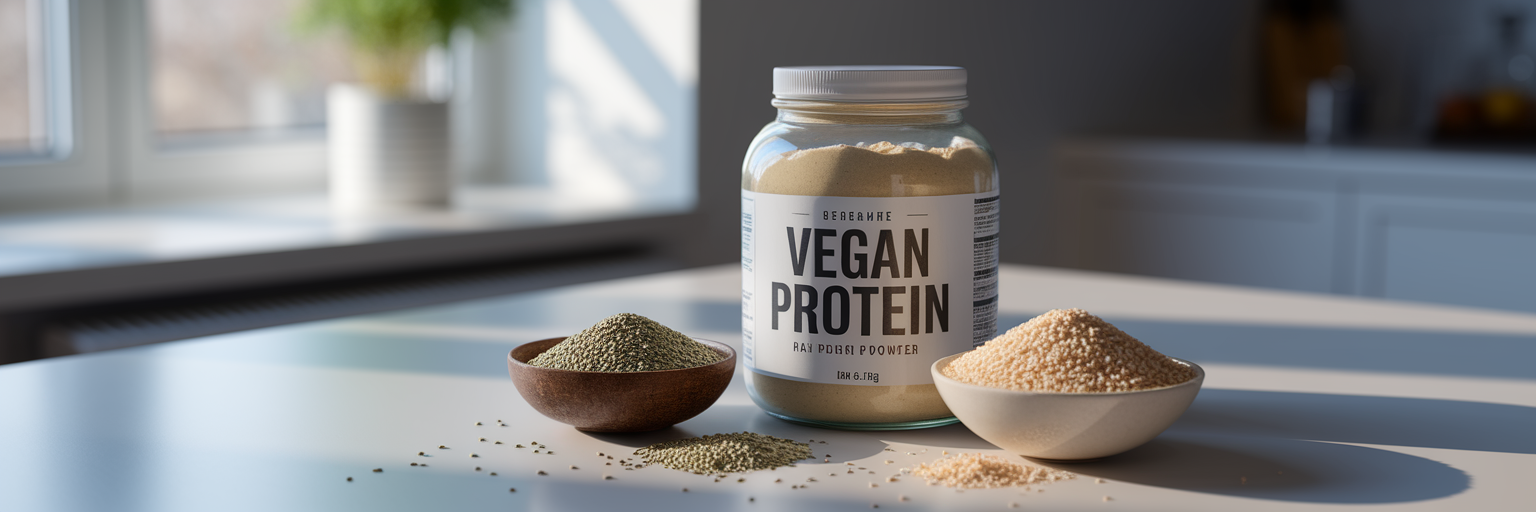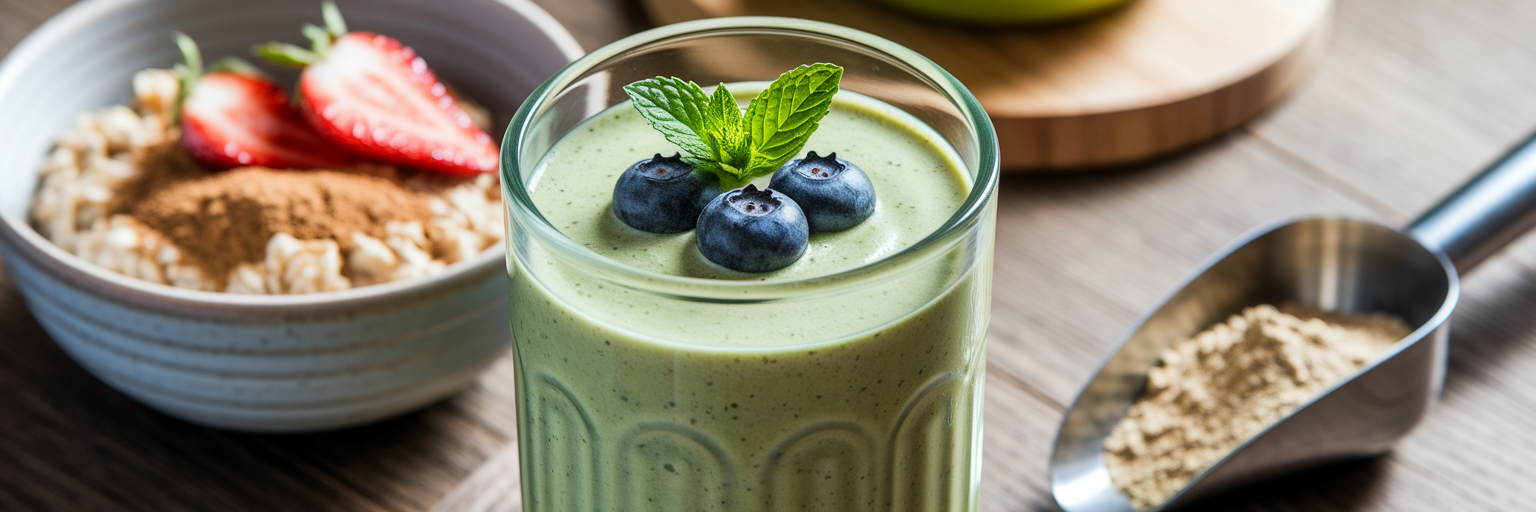Why Fasting and Vegan Protein Are a Powerful Combination
Intermittent fasting (IF) has become a familiar wellness practice across the US, but it often comes with a nagging question: "Will I lose muscle?" It’s a valid concern. When you restrict your eating window, your body looks for energy, and the fear of intermittent fasting muscle loss is real. This is where vegan protein powder steps in, not as a complicated addition, but as a strategic and friendly partner for your fasting journey.
Think of it this way: both intermittent fasting and a plant-based lifestyle are rooted in conscious consumption. They encourage you to be more mindful of what you put into your body and when. Combining them isn’t about restriction. It’s about creating a complementary system that supports your health goals.
This guide is here to give you simple, friendly, and actionable tips on how to use vegan protein powder to maintain your energy and preserve muscle while you fast. We’ll show you how this powerful pairing can help you feel strong, satisfied, and successful on your wellness path.
Keeping Your Muscles Happy During a Fast
So, why is protein so important when you’re fasting? Let’s break it down without the complicated jargon. Your body is constantly in a state of repairing and building muscle tissue, a process called muscle protein synthesis. During a fast, your body can sometimes enter a state of muscle catabolism, where it breaks down muscle for fuel. This is the last thing you want.
Consuming enough protein during your eating window gives your body the building blocks it needs, known as amino acids, to keep that repair process going strong. It essentially sends a signal to your body: "Hey, we have plenty of fuel here, no need to break down our precious muscle!" These amino acids are also essential for other functions, and some people find that supplementing with specific compounds can further support performance. For instance, insights we've shared on creatine show how it aids in energy production during short bursts of effort.
Plus, there's a wonderful side benefit: satiety. Protein is known for helping you feel fuller for longer. A protein-rich meal can make your fasting window feel much more manageable by keeping hunger at bay. Research from institutions like the National Institutes of Health consistently supports the idea that adequate protein intake is crucial for preserving lean muscle mass, especially during periods of calorie restriction.
Choosing Your Plant-Powered Protein Partner

Walking down the supplement aisle can feel overwhelming, but picking the right vegan protein is easier than you think. Your goal is to find a clean, effective product that aligns with your body and your fasting goals. Not all plant proteins are created equal, but this quick guide can help you find the best plant based protein for fasting.
Here’s a simple breakdown of the most common types:
| Protein Source | Key Benefit | Best For |
|---|---|---|
| Pea Protein | Rich in BCAAs, hypoallergenic | Muscle building and recovery |
| Brown Rice Protein | Good source of fiber, smooth texture | Blending into smoothies, easy digestion |
| Soy Protein | Complete amino acid profile | A balanced, all-in-one protein source |
| Hemp Protein | Contains omega-3s and fiber | Adding a nutritional boost with healthy fats |
Look for a powder with a complete amino acid profile. This just means it contains all nine essential amino acids your body can't make on its own. Soy and some hemp proteins are complete, but many of the best options are blends, like pea and rice protein, which work together to provide the full spectrum. When you check the label, steer clear of powders with long lists of artificial ingredients, fillers, or high amounts of added sugar. For those with sensitive stomachs, fermented vegan proteins can be a fantastic choice, as the fermentation process makes them easier to digest and absorb. Once you know what to look for, you can explore some of our favorite high-quality protein powders.
The Golden Rule: When to Take Your Protein
You’ve picked your protein, so now for the big question: when to drink protein shake fasting? The answer is simple and is the golden rule of this entire process: always consume your protein powder within your designated eating window. This ensures you don't break your fast and disrupt the metabolic benefits you're working to achieve.
With that rule in mind, there are two ideal times to incorporate your protein shake for maximum benefit:
- Right After Your Workout: If you exercise during your fasting period, having a protein shake within an hour or two of finishing your workout (and starting your eating window) is perfect. Your muscles are primed for nutrient absorption at this time, and the protein will go straight to work repairing and rebuilding tissue.
- With Your First Meal: Using a protein shake to break your fast is another excellent strategy. It provides a quick-absorbing source of nutrients to replenish your body and helps control hunger for the rest of your eating window. It sets a stable, satisfying tone for the day.
For those on standard schedules like 16:8 or 18:6, sticking to these timings is the best practice. While some people on extended 24-hour fasts might consider a small, pure protein shake, for most of us, keeping it strictly within the eating window is the key to success. Feel free to browse our entire collection of products that fit perfectly into these strategies.
Beyond the Shaker Bottle: Tasty Protein Ideas

Let's be honest, a plain protein shake can get a little boring. The good news is that your vegan protein powder is incredibly versatile! Moving beyond the shaker bottle makes it easier to stay consistent and actually enjoy your protein boost. Here are a few simple and delicious ideas, including some vegan protein shake recipes and other creative uses.
- The Fasting Finisher Smoothie: This is a classic for a reason. Blend one scoop of your favorite vegan protein powder with a handful of spinach, half a frozen banana, a tablespoon of almond butter, and unsweetened almond milk. It’s a nutrient-dense and delicious way to break your fast.
- Power-Up Your Oatmeal or Yogurt: Simply stir a scoop of vanilla or unflavored protein powder into your morning bowl of oatmeal or plant-based yogurt. It adds a creamy texture and a serious protein punch to kickstart your eating window.
- No-Bake Protein Bites: Mix one cup of oats, a half-cup of nut butter, a third-cup of maple syrup, and two scoops of protein powder. Roll into small balls and refrigerate. They make for a perfect, grab-and-go snack.
- Boost Your Baked Goods: Add a scoop or two of protein powder to your favorite pancake, waffle, or muffin mix. It’s an easy way to make your favorite treats more filling and nutritious.
These are just a starting point. For more inspiration, check out these three easy vegan protein recipes you'll find yourself making again and again.
Navigating Potential Digestive Discomfort
Trying a new protein powder and feeling a bit of bloating or discomfort? First off, know that this is completely normal. Your digestive system sometimes needs a little time to adjust to something new. Instead of giving up, there are a few simple tweaks you can make to ensure a smoother experience.
Here are some practical tips to help your body adapt:
- Start Small: Don't go all-in with a full scoop on day one. Try starting with a half-serving for a few days to give your system a chance to get acquainted with the new addition.
- Check the Ingredients: Often, the culprit isn't the protein itself but the other things in the tub. Look for high-quality powders that are free from artificial sweeteners, gums, and fillers, as these are common causes of digestive upset.
- Sip, Don't Chug: Drinking your shake slowly gives your body more time to digest it properly. Also, make sure it's blended thoroughly to break down any clumps.
By being mindful of these small adjustments, you can usually resolve any discomfort and get back to enjoying the benefits. If you have more questions about ingredients or how to use our products, our FAQ page is a great resource.
Protein Powder Is a Supplement, Not a Substitute

While vegan protein powder is an incredibly useful tool, it’s important to remember its role: it’s a supplement, not a substitute for a healthy diet. The foundation of your wellness journey should always be built on whole, nutrient-dense foods. Think of your protein powder as a helper that fills in the gaps and supports your goals, especially on busy days or after a tough workout.
Continue to build your meals around plant-based powerhouses like lentils, chickpeas, tofu, tempeh, quinoa, and nuts. These foods provide not only protein but also essential fiber, vitamins, and healthy fats. When viewed as part of a complete nutritional strategy, protein powder becomes one of the best US supplements for energy and recovery.
Ultimately, the best approach is to listen to your body. Pay attention to your energy levels, hunger cues, and how you feel. Adjust your intake as needed, and remember that you are in control of your health journey. We invite you to explore our commitment to clean, plant-based nutrition and join our community. Have any favorite fasting-friendly meal ideas? Share them in the comments below!



